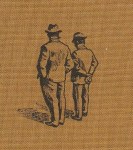I told a lie in my post the other day. Sort of.
The thing is, I’ve written to many literary giants down the years. Two alone have denied me satisfaction*.
I don’t know why they slipped my mind. The silence of one of these lambs, Stephen Poliakoff, chimes very much with an even-more-deafening silence – the one currently engulfing me.
Maybe that applies to the other lamb too. His name? Julian Barnes.
This calls for a preamble. Way back in the mists of time, maybe a million years ago, having (more by bad luck than misjudgement) caught a repeat of a Jeremy Brett era Sherlock Holmes adaptation on TV, I reread said story.
I’d read it many times before but this time I recognised (or thought I recognised) a teasing, playful reference to a place I now knew well. And, as I let this sink in, it also began to dawn on me that there were other teasing, playful hints and suggestions here. There were veiled autobiographical allusions, surely, to a love affair.
Or were there? I’m always terribly suspicious of the sorts of people who seem more-than-naturally attuned to veiled allusions… whether in songs or pictures or stories or indeed the main evening news from the BBC.
Especially as this veiled allusion ran so unambiguously contrary to conventional wisdom. Leaving fairies to one side, the definitive biographical fact about the sainted Sir Arthur Conan Doyle is the notion that he was a devoted and faithful husband – a man who refrained from pursuing intimate relations with the woman who was to become his second wife until the first one was dead.
But hey, you know, it was a slow week… and having joined forces with my former partner-in-crime, Sebastian Bell, we set off on a plodding, unhurried investigation, low on expectation, high on (what I now strongly suspect to have been) life.
But blow me down if we didn’t start dusting off circumstantial evidence that we were on the right track; and then, in short order, we unearthed a weightier and (potentially) shinier nugget.
And of course, being as venal as we were narcissistic, we knocked together a feature proposal and sent it off to the arts desks of The Sunday Times and The Guardian, where Sebastian still had friends (or at least people he’d not yet managed to upset while in his cups).
We waited. I think at one stage, jointly, severally, we held our breath or breaths. How long should it take for your cloudy dreams, even modest dreams like this, to evaporate? Thomas Mann, in one of my favourite ever passages, writes compellingly about this – the process by which fervour and optimism are ever-so-slowly replaced by that sinking feeling… and as a serial-sufferer I’ve always been fascinated by the metaphysics of this sort of rejection, bittersweet and subtle rather than deep and dark.
But anyway, it took a week, maybe more, for us to steel ourselves to make the follow-up calls.
The guy at The Guardian said he absolutely wasn’t interested. His readers, he solemnly informed us, were Progressives and certainly weren’t interested in tittle tattle about a dead white male writer, especially one so complicit in war crimes. (No. Me neither. To this day, I have no idea what he meant.)
The lady at The Sunday Times had far worse in store for us. She’d taken some soundings, she said, not least from a world-renowned expert on Conan Doyle, who’d made it crystal clear to her that our story was arrant nonsense.
But we have a photocopy, we said.
Bung it in the post, she parried.
For one reason or another, and the details are hazy now, we declined to do this.
 Not long after, Julian Barnes published Arthur and George, a work of historical fiction in which the conventional wisdom about Sir Arthur’s fidelity is rehashed.
Not long after, Julian Barnes published Arthur and George, a work of historical fiction in which the conventional wisdom about Sir Arthur’s fidelity is rehashed.
It’s no big deal. It’s not an essential part of the story. It’s in no way central to the brilliance of the book.
And I feel I must declare an interest here. I’d like it on record that I am a fan. I’d go so far as to state my belief, my IMHO manifesto, that Julian Barnes is the world’s greatest living writer.
But at some point, maybe a decade ago, I dropped him a line through a recognised channel. “Thought you might be interested to know,” I wrote, chirpily… “Sir Arthur Conan Doyle wasn’t faithful to his first wife. Far from it. Might you be interested in seeing evidence?”
Julian didn’t reply.
It’s only now, in long hindsight, that I am able to work out why.
He clearly thought I was offering to send him dirty pictures. Possibly drawn by yours truly. In wax crayon.
* 1 November 2021: revisiting this today, quite by chance, I now realise, with the benefit of hindsight, that the phrasing here is disingenuous. My reasoning seemed sound at the time, less so now. Suffice to say that the two instances in question don’t deserve to be conflated. Not by a long shot.